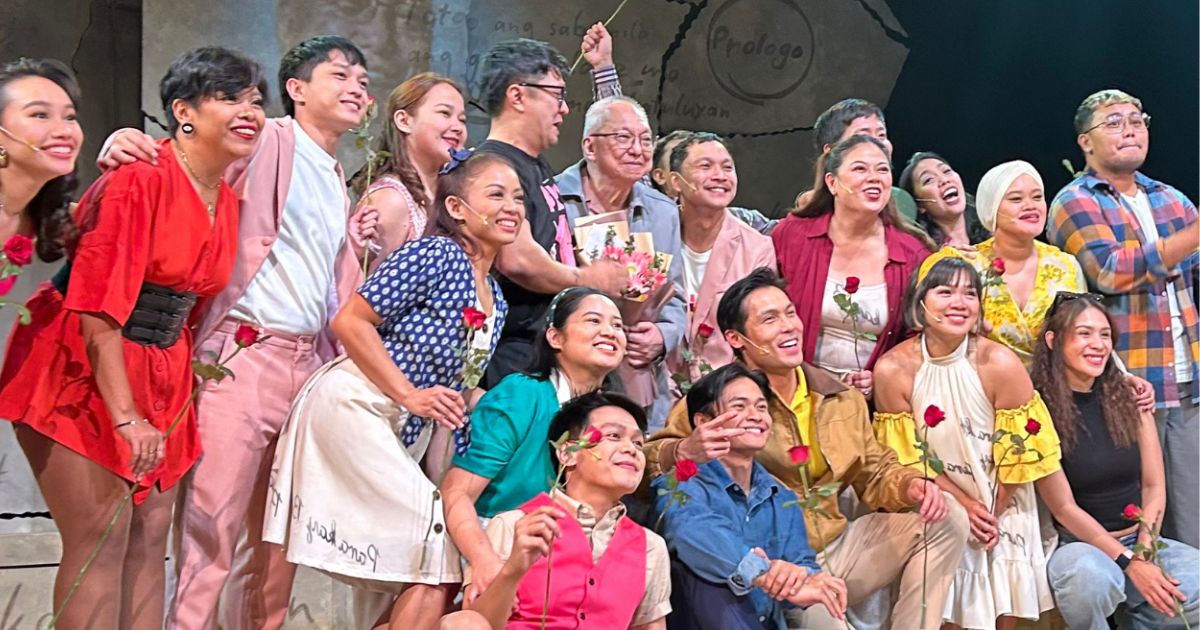Ricky Lee's 'Para Kay B' on stage bravely explores love and stories we don't tell

The highly-anticipated adaptation of Ricky Lee's debut novel, "Para Kay B," has graced the theater stage.
Originally released in 2008, this compelling narrative has now been reimagined as a powerful theatrical performance, blending Lee's storytelling expertise with the energy of a live act.
"Para Kay B" unfolds through the eyes of Lucas, a frustrated writer who introduces us to five women, each navigating their own complex love stories.
1. Irene: Gifted with a photographic memory, Irene clings to a childhood promise made by her first love, Jordan. Their reunion years later reveals the painful reality of forgotten commitments.
2. Sandra: Defying societal norms, Sandra's forbidden affection for her brother, Lupe, leads to profound consequences, challenging the boundaries of familial love.
3. Erica: Hailing from Maldiaga, a town where love is an alien concept, Erica's quest to understand love transports her to Manila, where she meets Jake. Their journey together is a poignant exploration of discovery and yearning.
4. Ester: A narrative that courageously addresses same-sex love, Ester's affection for their family's maid, Sara, unfolds amidst societal prejudices, highlighting the struggles of embracing one's true self.
5. Bessie: The culmination of the stories, Bessie's tale intertwines with Lucas's own, offering a meta-narrative that blurs the lines between creator and creation.
This is Lucas's theory:
"Me quota ang pag-ibig. Sa bawat limang umiibig, isa lang ang magiging maligaya. Ang iba, iibig sa 'di sila iniibig. On iibig nang 'di natututo. O iibig sa wala. O 'di iibig kailanman."
These are not your typical boy-meets-girl narratives. Instead, they challenge our perceptions of love, offering fresh and often uncomfortable perspectives on the complexities of human connection. It's these stories that make Para Kay B stand out, as it dares to question societal norms around love and relationships.
The Confrontation: A voice for the unheard
One of the most powerful moments of the play comes in the second act, where the characters confront the writer who has shaped their fates. They demand answers, asking why only one of them will find happiness. The characters are upset with the idea that their stories are reduced to mere theories, dictated by the writer's perception of what love should look like.
It's in this confrontation that the play's deeper message emerges — the idea that the characters, particularly the female ones, are not just vessels of a love story but are individuals with their own desires, thoughts, and complexities. As a female audience member and writer myself, I found this moment deeply resonant.
It spoke to the idea that characters — especially women — are often written in a way that doesn't reflect their full humanity, their nuanced thoughts, and their deep emotions.
The writer, being male, fails to fully understand and portray the female experience, which leads the characters to demand that their stories be told more truthfully.
This confrontation, laden with raw emotion, serves as a critique of how love stories have traditionally been written — from a singular, often one-dimensional perspective. It made me reflect on the importance of empathy and deeper understanding, both in writing and in life.
A stage that speaks
Visually, "Para Kay B" is striking. The minimalist stage design, adorned with words and writings, feels like a living, breathing book. The characters, all dressed in white with the words "Para Kay B" printed on their clothes, felt like they had stepped out of the pages of the novel itself.
Despite the large ensemble cast, the stage never felt overcrowded. Instead, it felt intentional — each element purposeful in contributing to the narrative's atmosphere.
What sets this play apart is its fearless approach to unconventional love stories. By delving into themes often considered taboo, such as incestuous feelings, same-sex relationships, and unrequited love, the play challenges audiences to confront their perceptions and biases. It's a refreshing departure from traditional narratives, offering a raw and honest portrayal of human emotions.
The production's strength lies in its ability to balance humor with heartache. It is a journey through the complexities of love and the way we define our relationships.
But, most importantly, it left me with a powerful takeaway — that we are the authors of our own stories. We don't need to conform to someone else's idea of what love should be.
We don't have to pressure ourselves to fit into a mold, to be part of a narrative that doesn't serve us. We must simply live and let our stories unfold naturally.
In many ways, this play is a love letter not just to the art of storytelling but to the freedom of self-authorship. As the characters demand to be seen, "Para Kay B" challenges all of us to see ourselves beyond the narratives that society and others try to impose on us.
The cast of "Para Kay B" includes Nicco Manalo, Gold Aceron, Jay Gonzaga, Wency Vencila, Divine Aucina, Yesh Burce, Liza Diño-Seguerra, and more.
It will run until March 30, at the Doreen Black Box Theater at Ateneo De Manila University.
Tickets are priced at P1,800 for free seating and P2,000 for reserved seating.
—MGP, GMA Integrated News




